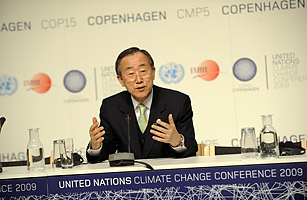
The UN global warming summit in Copenhagen at the end of 2009 was meant to be a climate coronation. It turned out to be a funeral. Thanks in part to the fact that the U.S. was unable to come up with its own climate legislation in time, hopes were already dim for a global deal on carbon at Copenhagen. But once the meeting commenced, things went downhill fast. The conference was a logistical nightmare, with crowds pressing outside the Danish capital's Bella Center, which was filled beyond capacity. There were angry protests in the streets, but stasis inside the conference center, with negotiations dragging on for days with little progress. Developing countries complained that they were being shut out of the talks, even though their citizens would suffer the worst effects of climate change.
Not until President Barack Obama and scores of other world leaders arrived at the end the summit was a last-minute consolation deal clinched — with a vague agreement to keep the global temperature rise to less than 2°C — but one that fell far below the expectations of environmentalists. Perhaps worse, the chaos at Copenhagen underscored doubts about the nearly two decade-old UN climate process itself — but it's far from clear what else might work.